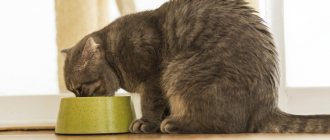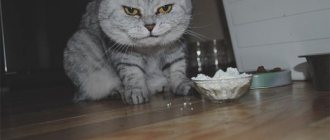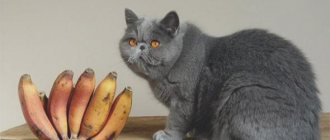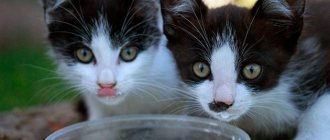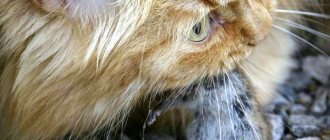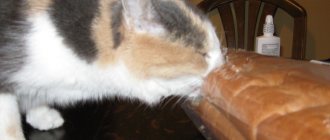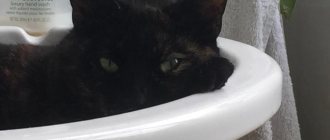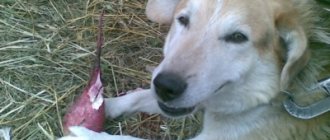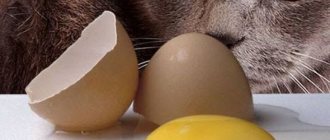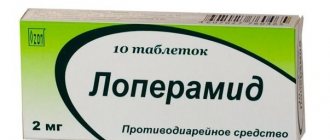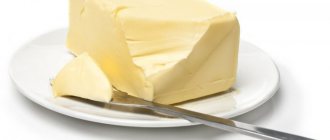5624Pavel
1
Cats have always lived next to humans. For many centuries in a row. In the old days, of course, there was no ready-made food and they were fed whatever was available. From your desk, so to speak. With meat, everything is clear; cats love it. But not every owner of a furry friend knows whether cats can eat nuts.
Many people adhere to the rule that a cat is an intelligent animal and will not eat foods that are harmful to itself. Often, such an opinion can serve as the beginning of the development of serious diseases precisely because of improper feeding of your pet and indulging its desires. After all, how touching it can sometimes be to look at a picture of a cat catching another mischief from the owner’s table and raising its paws funny at the same time and meowing funny. The owners have fun that is sometimes destructive for the cat.
© shutterstock
The cat's body and plant foods
To better understand how a cat's organs and systems function and how domestication has affected them, it's worth taking a closer look at cat anatomy:
- As already mentioned, domestic mustachioed striped animals have not lost their predatory nature and still remain “meat eaters”.
- During the process of long-term natural selection, their liver acquired some immaturity, since it ceased to produce large amounts of enzyme substances capable of neutralizing toxic components.
- Wild cats today feed on birds, mice and other living creatures, just like their ancestors. And food of plant origin most often enters their body along with prey, having already been processed by the digestive tract of animals or birds. Therefore, the liver of cats is not adapted to process a large number of harmful components and has long ceased to develop in this direction.
This feature of the body is often harmful for domestic cats, since their diet sometimes consists of foods that are not at all suitable for feeding predators.
Nuts on the menu for domestic cats
Nuts most often top the list of foods prohibited for feeding furry pets. And there are several very serious reasons for this:
- Many nuts that are harmless to the human body contain toxins that are extremely harmful and even dangerous for representatives of the cat world.
- Most nuts are heavy, fatty foods that put a strain on the animal's liver. As you know, this organ is not able to cope with such food. This also threatens the cat's obesity.
- Nuts are rich in phosphorus, which is necessary and beneficial for a cat’s body, but in extremely moderate quantities. And when consuming nuts and seeds, even in small quantities, there is a high risk of an excess of this component. When there is an excess of a microelement, alarming symptoms begin to appear. The pet becomes inactive, lethargic, and apathetic. Sudden vomiting may occur for no apparent reason. The cat does not eat or drink, even refusing its favorite treats. This condition requires mandatory intervention on the part of the owner. You should exclude nuts and seeds from your cat’s diet and be sure to visit a veterinary clinic with your pet.
- Many nuts contain the protein amino acid arginine, which is involved in important metabolic processes. It is necessary for the synthesis of urea from ammonia, stimulation of the secretion of growth hormone and insulin. But this is not a reason to give your cat nuts. It is possible to provide the animal’s body with a sufficient amount of arginine in a safer way. For example, there is a lot of this element in meat, a product that the feline digestive system perfectly digests and assimilates. This is how these representatives of the fauna are arranged.
And in order to completely eliminate the possibility of violations, it is better to completely exclude these products from the cat’s menu. It is important to warn household members and guests that such a treat can threaten the cat’s death.
Harmful products
Avocado and eggplant
The herbal product contains persin, which has an irritating effect on the mucous membrane of the gastrointestinal tract, as a result of which the cat may experience vomiting, diarrhea, and breathing problems. Some cats prefer avocado because of its oily texture, but it is important for owners to remember that this product should absolutely not be given. Eggplant contains solanine, which can cause intestinal upset, so this vegetable is also prohibited.
Onion and garlic
When consuming such a root vegetable, the animal experiences liver dysfunction.
The first herbal product includes disulfide, which has a destructive effect on pets' red blood cells, as a result of which hemolytic anemia sometimes develops. This product is harmful in dried, powdered, boiled and raw form. Garlic contains a smaller amount of this substance, but it is also not beneficial for cats. Some pet owners are convinced that this herbal product can be given to their pets, as it is beneficial for people. However, it is important to remember that the functioning of the liver in cats and people is seriously different, so even a one-time consumption of these vegetables can cause death.
Citrus and nuts
Oranges, lemons, and grapefruits are not good for the cat's body because they provoke nausea and vomiting. Pineapples and kiwi have the same properties. You will also need to exclude peanuts, walnuts and macadamia nuts from your pet’s diet. These plant foods are rich in phosphorus, an increase in the level of which is undesirable for the cat's body.
Bananas and persimmons
The first plant product contains sugar, which is considered heavy food for pets. Enzymes that contribute to the proper absorption of such food are absent in the cat’s body, so after eating bananas the concentration of sugar in the blood increases greatly. A one-time consumption of bananas will not cause serious problems in the body, but a systematic increase in the level can cause the development of diabetes mellitus, which cannot be treated. If we talk about persimmon, then its seeds can become the cause of blockages in the intestines and inflammation of the small intestine.
"Killer" nuts
Almost all fruits with a hard shell and edible core contain toxic substances. Often their concentration is insignificant.
However, there are some of the most dangerous nuts that can be fatal. This category includes:
Dangerous consequences. They are the most toxic; eating them can cause damage to the animal’s central nervous system and digestive tract. Severe intoxication is accompanied by intense spasms and convulsions, affecting muscle tissue of all groups. Poisoning also manifests itself in a number of less pronounced symptoms:
- Indigestion - a foamy impurity may appear in loose stools, and the vomit is also foamy.
- Changes in behavior - anxiety, nervousness or, conversely, melancholy and apathy.
- Decreased activity - the cat hides away from the owner and lies down most of the time.
- Changes in the color of the mucous membrane - it may become pale, bluish, red or yellowed.
This set of violations threatens the pet’s life, which means it must be immediately shown to a veterinarian.
Not all cat owners understand the dangers nuts pose and periodically give them to their pets. And they, in turn, often turn out to be real gourmets and beg for a forbidden delicacy. In such a situation, it is better for the owner to exercise prudence and not expose his furry pet to such serious risks.
Proper nutrition for a domestic cat
Do not forget that over many centuries, cats have developed their own gene pool and physiological characteristics . So, cats are inherently predators and their entire body is adapted to digest meat products. Because of this, the digestive system and especially the liver are organized in such a way that they cannot immediately process large amounts of toxins and poisonous substances. Such substances may be contained in products that are absolutely safe for other animals or humans.
Even a small dose of the toxin, if consumed systematically, can lead to the death of your pet. So you should carefully monitor your cat’s diet at home and avoid mistakes. The list of questionable products for cats is long, but here we will consider an issue that causes a lot of doubt and controversy among cat owners.
Can cats eat nuts?
Cats have always lived next to humans. For many centuries in a row. In the old days, of course, there was no ready-made food and they were fed whatever was available. From your desk, so to speak. With meat, everything is clear; cats love it. But not every owner of a furry friend knows whether cats can eat nuts.
Many people adhere to the rule that a cat is an intelligent animal and will not eat foods that are harmful to itself. Often, such an opinion can serve as the beginning of the development of serious diseases precisely because of improper feeding of your pet and indulging its desires. After all, how touching it can sometimes be to look at a picture of a cat catching another mischief from the owner’s table and raising its paws funny at the same time and meowing funny. The owners have fun that is sometimes destructive for the cat.
Features of the digestive system
Cats are predators, everyone knows that. The process of hunting itself gives them unimaginable pleasure. Well, it’s quite natural that the hunt ends with a catch of prey. Cats are calculating and smart in their jumps, which means that very often the hunt ends with the extraction of meat. Their intestines and teeth are designed so that they can eat raw meat, tearing apart their prey. Where can we get away from the genes of predatory ancestors? After all, this is the only food that cats could get while living in the wild. They could also chew grass for medicinal purposes; this, perhaps, was all their food.
But domesticated cats are luckier. Their diet is quite extensive and consists not only of meat. Caring owners add fish, vegetables, dairy products, eggs, grains, cereals and sometimes goodies to it. It is the goodies that are the most dangerous for a cat, and this is a fairly large list of products that you need to know by heart :
- chocolate,
- nuts,
- mushrooms,
- potato,
- beans and all legumes,
- alcohol,
- tomatoes,
- garlic and onion,
- grape,
- citruses.
Prohibited Products
Let's take a closer look at products that are harmful, and sometimes even dangerous for cats. What not to feed our furry pets.
Chocolate, products containing cocoa. You can often see videos posted online, showing how funny a cat looks, jumping up and catching pieces of chocolate in flight. A funny video, a sea of positive emotions and undeniable harm caused to the cat's health. The thing is that chocolate contains the substance theobromine, which is quite toxic to the cat’s body.
Once in the animal's body, it can cause an attack of arrhythmia, affect rapid heartbeat and have a diuretic effect. This is if you feed your cat chocolate regularly. If she eats chocolate from time to time, hyperactivity can be observed, and cats also begin to feel thirsty. Eating too much chocolate at one time can trigger a heart attack, as well as cause vomiting and diarrhea. As you can see, cute entertainment can cause serious damage to a cat’s health.
Sweets
Candies, chocolate, etc. should not be given to four-legged animals under any circumstances. Caffeine, theobromine and other sweet ingredients can only be absorbed by the human body. They are very toxic for cats. If you feed your pet sweets, your pet may develop kidney failure.
Igor Nikolaev and his daughter Veronica starred in the program “Guess the Melody”
What did the Russian princess look like, thanks to whom the War of 1812 could have been avoided?
Wales: The water in St. Seiriol's well was believed to have healing powers
In addition, most sweets contain too much sugar. It is not safe for humans either, let alone four-legged pets. Some sweets contain sweeteners. They can even cause an attack of suffocation in the animal.
Nuts
Despite the large amount of phosphorus in them, which is good for health, nuts are strictly contraindicated for cats. The same can be said about seeds. Even a small amount of healthy nuts can cause an excess of phosphorus. Most nuts are dangerous for cats, but of all, walnuts can be called the most harmful. As well as nuts called macadamia nuts, their consumption by a cat can cause damage to the nervous and digestive systems due to their increased toxicity.
In addition, absolutely all types of nuts put a certain burden on the cat’s liver, being a toxic product for this organ. It is precisely because cats are carnivores that their livers are not adapted to introducing foods other than meat into their diet.
Symptoms of phosphorus poisoning can be noticed immediately: the cat becomes lethargic and apathetic, sudden bouts of vomiting may begin, and the animal refuses to eat and drink. It’s good if the owner immediately pays attention to the symptoms and can connect their occurrence with feeding his pet nuts. This is why giving your cat nuts is strictly not recommended. However, not only cat owners, but also dog owners know this. The latter are also recommended not to include nuts in their diet. Animal nutrition should be balanced and include healthy foods.
What foods should cats not eat?
What not to give to your furry pet, even if he begs for it. List of dangerous foods for cats.
Many foods are controversial as to whether they can be given to a cat or not. The list below contains products that are dangerous to the health of the animal. No matter how the fluffy purr tries to beg for a piece, you should not follow his lead. After all, momentary weakness can lead to dire consequences.
To keep your pet healthy and to be sure that its diet is balanced and healthy, we recommend not experimenting with products, but choosing high-quality premium, super-premium or holistic class cat food. Because it is impossible to create a balanced menu on your own and without special education that would meet all the requirements of the animal’s body. And to please your pet with a tasty treat, there are special treats for cats.
Can a cat eat pork or lard? It is not recommended.
Pork is too fatty meat and is poorly absorbed by the animal’s body. Frequent consumption of pork threatens not only weight gain, but also the development of diseases such as pancreatitis, liver cirrhosis and chronic renal failure. Raw pork may contain eggs of helminths and other parasites.
Wild boar meat can be found in holistic foods; do not confuse these two completely different types of meat. The meat of wild animals is initially not as fatty as that of domestic animals. Therefore, the food is not oversaturated with fats and will not harm the pet. On the contrary, wild boar meat is considered dietary and is used in feed for animals prone to weight gain.
Can a cat eat potatoes? It is not recommended.
Green potatoes are poisonous to cats; never allow your pet to chew or play with them. Ordinary raw or boiled potatoes, without special treatment, are absolutely useless for the animal. Starch, which is present in large quantities in potatoes, is not digested and prevents the body from receiving other beneficial substances contained in the tuber.
If your cat is very interested in peelings or raw potatoes, it is likely that she is simply cleaning her teeth this way. To avoid problems with the gastrointestinal tract after raw potatoes or poisoning from peelings, give your pet special treats for cleaning teeth.
Many quality cat foods include potatoes. The question often arises: “why?” if in its raw form it is useless for the animal. Dry food uses dried potatoes that are extruded—processed with heat and pressure. Potatoes contain vitamins (B3, B6, C, etc.), minerals (manganese, phosphorus, etc.), antioxidants, as well as potassium, iron, copper and fiber. Starch, which prevented the absorption of these beneficial substances, is eliminated from the composition after processing, so potatoes in dry food are healthy and well absorbed.
Can a cat have bread, yeast dough, pasta - it is not recommended.
Flour products do not contain any beneficial substances for cats, but can cause stomach upset, bloating and gas formation. Why turn a cat into a weapon of mass gas-air destruction?
Can a cat have broccoli - not recommended.
Broccoli contains fiber and vitamins that are beneficial for the cat's body, but it contains isothiocyanate, which in large doses is toxic to four-legged friends. In order to maintain the balance of nutrients and not harm the pet’s health, broccoli should not exceed 5% in the pet’s diet.
Can a cat eat mushrooms? It is not recommended.
Edible mushrooms purchased from a reputable store will not harm your cat, but they will also do no good. You should not treat your pet with raw mushrooms, and you should not risk giving them mushrooms collected in the forest, even for play.
Mushrooms contain toxins that are dangerous to animals, so it is better to simply exclude this product and not risk your pet’s health.
Can a cat have sausages? It is not recommended.
How can you resist the pitying look begging for a piece of sausage? Meat is the most important element in an animal’s menu, but in addition to meat, sausage and frankfurters contain a lot of salt and other products that will not be beneficial for the animal’s body. You cannot include sausage and frankfurters in your cat’s diet on a regular basis, but you can treat them to a small piece once a week.
Can a cat have milk? It is not recommended.
Most cats cannot digest lactose, which is found in dairy products, so drinking milk can cause an allergic reaction and stomach upset.
Can a cat eat legumes? It’s not recommended.
Without proper processing, legumes cause bloating. Yellow peas can be found in cat food. It consists of many natural fibers that help improve digestion and is a source of plant carbohydrates. Thanks to special processing, yellow peas become an excellent protein supplement and do not cause any side effects.
Can a cat have avocados? No.
Avocados contain persin, which is toxic to cats. Consuming this product may cause serious poisoning and stomach upset. Severe allergic reactions are possible, which can lead to death, breathing problems and fluid accumulation around the heart muscle tissue.
Can a cat have oranges, pineapple, kiwi - no.
Citrus and exotic fruits cause stomach upset in animals. Severe poisoning or an allergic reaction may occur. Even if the animal does not appear to have any symptoms at first glance, you should not continue to treat your cat with such products. The substances contained in these fruits can cause chronic diseases in the animal's body.
Can a cat eat grapes? No, raisins.
Grapes and raisins contain toxins that are poisonous to cats. These products are harmful in any form; even cottage cheese with raisins or a bun can cause severe poisoning, even death.
Can a cat have garlic, onions - no.
Onions and garlic contain disulfite, which destroys red blood cells in animals and causes anemia. Poisoning may not appear immediately. Main signs: stomach upset, vomiting, loss of appetite, lethargy. If these symptoms occur, contact your veterinarian immediately. Onion and garlic poisoning can be fatal.
Can a cat have chocolate, sweets, sugar? No.
Theobromine, found in chocolate and cocoa, is toxic to cats. Signs of poisoning: increased activity, disorientation, thirst, upset stomach.
Cats cannot control their intake of sweets because... they do not distinguish its taste. Sugar disrupts the digestive system and metabolism, weakens the immune system, and leads to dental problems and diabetes.
You can read more about cats and their relationship to sweets in our blog, article “cats have a sweet tooth”
.
Banana in a cat's diet: benefit or harm
In the process of evolution, the digestive system of each living organism has developed in such a way that the food characteristic of this species is most easily digested and absorbed. This also applies to domestic cats; the cat family in the wild feeds exclusively on meat, which contains a lot of protein.
We suggest you read: How to properly train a cat and what commands you can teach it
The sugar contained in ripe bananas is a dangerous product for the cat’s body; it is difficult to digest and an excess leads to a decrease in immunity. As a result, the animal becomes lethargic and drowsy. Even for humans, two bananas a day is considered the norm, as this is a difficult product for the stomach.
The cat's stomach will take even longer to digest it. In addition, few people know that their liver is structured differently and lacks the ability to process substances contained in plant foods. This is due to the fact that in nature they get plant food that is already half processed (from the stomach of the caught prey).
Many owners are of the opinion that the desire to try a banana is due to a lack of one or another vitamin or microelement. In fact, this is not at all the case; the cat does not have such knowledge and, even on an instinctive level, is not able to diagnose itself. But a new unfamiliar smell can easily attract attention, and banal curiosity will force you to try a piece, because cats are extremely curious.
If, after trying a piece, your ward begs for more, then do not think that she liked its taste. They don’t taste sweets at all for a very simple reason: their tongue has only 500 taste buds, while humans have over 9,000.
This fruit is beneficial to the cat's body, but there are cases when apples can cause harm to the animal. If the dose of product consumption is increased, due to the large amount of fiber entering the body, the cat may develop not only diarrhea, but also colitis. If the animal had stomach problems, then under no circumstances should you give it apples, because the acids they contain can cause pain in the gastrointestinal tract.
We suggest you read: Hematuria in cats is a hidden threat to the urinary tract
When preparing fruit puree for a cat, it is very important that no bones get into it, as they contain a lot of iodine, and this can cause a rash, diarrhea and vomiting in the animal. Apple seeds contain hydrocyanic acid, a powerful poison that can lead to death. Before buying apples, you should make sure that they were grown on a farm and that no chemicals were used to ripen them, since this is very harmful to the animal’s body.
You might be interested in:
- Mayonnaise for cats - can it be included in the diet?
- Can cats be given mashed potatoes?
- Nuts for cats: can they be given, benefits and harm?
- Can you give chips to cats?
- Is it possible to give cats mushrooms (and mushroom soup)
- Yogurt for cats: can it be given, benefits and harm?
- Is it possible to feed a cat liverwurst?
- Is it possible to give condensed milk to cats?
